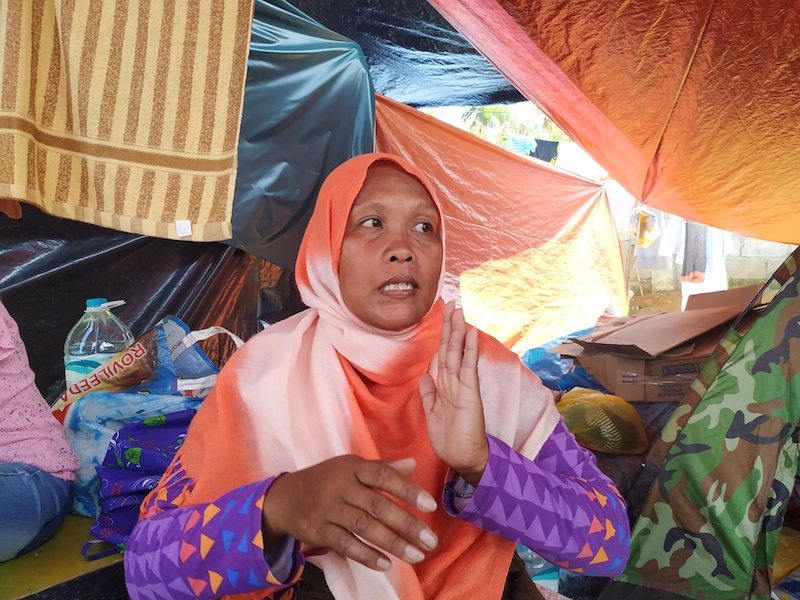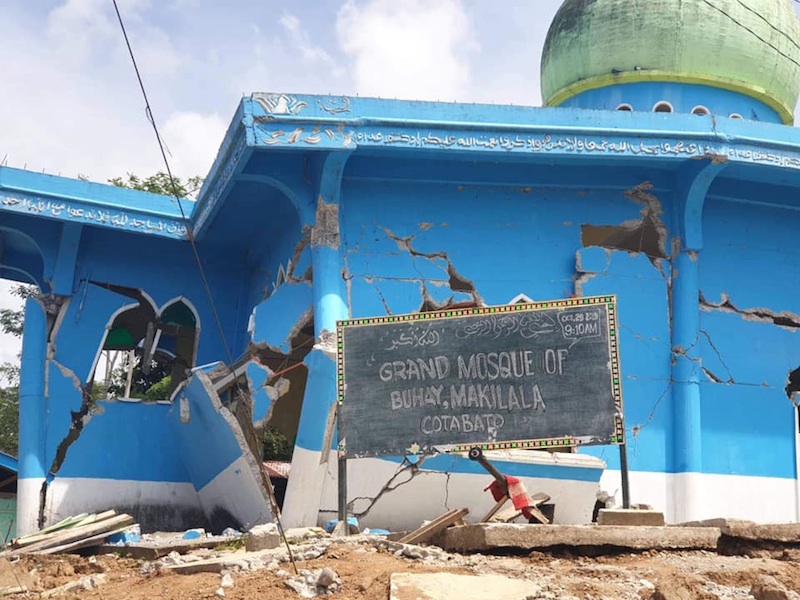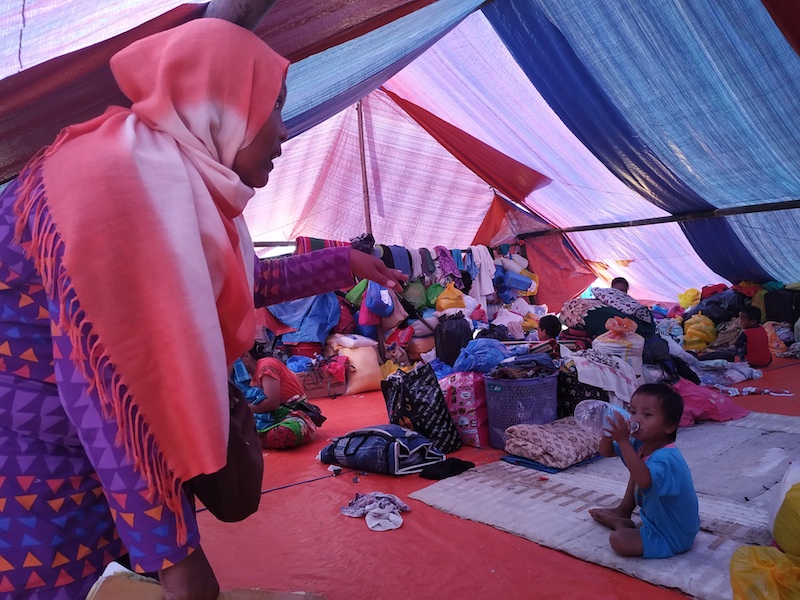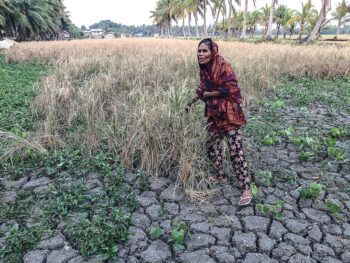MAKILALA, North Cotabato (MindaNews / 11 November) — Shawls or scarves that could be used as tundong (the veil that Moro women use) and prayer mats.
These are items that Moro evacuees in the evacuation camp at the Makilala Institute of Science and Technology in Barangay Concepcion hope would be given to them aside from the relief goods that they have been receiving since they fled Barangay Buhay at the foot of Mt. Apo after the Magnitude 6.5 quake struck Thursday morning, October 31.
As of Friday, the DSWD’s initial listing for validation put the number of evacuee families at 381, mostly from Barangay Buhay which has been declared as a “no-build zone.”
Of this number, MindaNews learned there are 299 Moro and Lumad families – 164 Moro and 135 Lumad families.
 Akisa Palawan, representative of Moro families in the evacuation camp at the Makilala Institute of Science and Technology in Barangay Concepcion, Makilala, North Cotabato, appeals for prayer mats and shawls or scarves that can be used as tundong (veil). MindaNews photo by CAROLYN O. ARGUILLAS
Akisa Palawan, representative of Moro families in the evacuation camp at the Makilala Institute of Science and Technology in Barangay Concepcion, Makilala, North Cotabato, appeals for prayer mats and shawls or scarves that can be used as tundong (veil). MindaNews photo by CAROLYN O. ARGUILLAS
Akisa Palawan, representative of the Moro families. told MindaNews that the prayer mats and the tundong are “pinakaimportante sa amo” (most important for us).
Naguib Sinarimbo, Minister of Interior and Local Government and concurrent head of the Bangsamoro Autonomous Region in Muslim Mindanao’s Rapid Emergency Action on Disaster Incidence (BARMM-READI), told MindaNews on Sunday that they will attend to these additional requests.
The BARMM-READI was among the first responders that delivered relief goods to residents in the affected areas in neighboring North Cotabato, regardless of religious affiliations.
On October 31, after the Magnitude 6.5 quake struck, BARMM-READI immediately delivered 11,000 bottled water and emergency food packs in Tulunan, Makilala, and the city of Kidapawan, hours after the people cried out on social media about their needs.
On November 3, it delivered food aid, tarpaulin and hygiene kits to quake-hit areas in North Cotabato and deployed firetrucks to provide water to residents of Kidapawan City whose water system was damaged by the quakes.
On November 6, it again delivered tent materials, bottled water and food packs in Makilala and Kidapawan
“We feel the agony of our neighbors. In times of peace and distress, we are all brothers and sisters,” Sinarimbo had earlier said.
Palawan acknowledges that it is unavoidable that relief goods that would be given to them may include items containing pork which is “haram” (forbidden)f for Muslims.
But she said the DSWD staff has proposed to them that in case the relief bags contain canned goods and cup noodles containing pork, they can bring these to the DSWD to be exchanged with non-pork items (see other story).
Zia Alonto, a Meranaw and Member of Parliament of the BARMM, said the Provincial Government of Lanao del Sur has conducted an ocular visit in barangays in North Cotbato that are believed to have hosted Meranaw families “in order to establish proper coordination with the barangay officials for the needed assistance” that the province will provide.
Lanao del Sur Governor Mamintal Alonto Adiong, Jr. “has pledged to continue extending medical and relief operations to the victims of this recent calamity,” he posted on his FB page on Monday.
 11buhaymosque
11buhaymosque
The grand mosque of Barangay Buhay in Makilala, North Cotabato, destroyed by the series of quakes including four above Magnitude 6 that struck between October 16 and 31. Photo courtesy of Maharlanny Macalangcom Alonto, Lanao del Sur Provicinal Social Welfare and Development chief, Lanao del Sur
He showed pictures of Barangay Buhay where a Masjid, houses and other barangay structures are heavily damaged due to the series of quakes that hit North Cotabato and neighboring areas. Four powerful quakes above Magnitude 6 struck between October 16 and 31: magnitude 6.3 on October 16, 6.6 and 6.1 on October 29 and 6.5 on October 31.
The Moro and Lumad communities in North Cotabato are a minority in the province whose population as of August 2015, according to the Philippine Statistics Authority was 1.38 million.
According to the historical narrative posted on the website of North Cotabato, “before the coming of the Christian migrants from Luzon and the Visayas which had accelerated the growth of settlements and subsequently gave rise to bustling municipalities, this area named Cotabato was inhabited by various ethnic groups namely: the Manobos, the Bagobos and the Muslims sometime in 1500 A.D.”
 Akisa Palawan, representative of Moro families in the evacuation camp at the Makilala Institute of science and Technology in Barangay Concepcion, Makilala, North Cotabato, shows MindaNews on Friday, November 8, 2019 their tent which she says houses 18 Meranaw families. Palawan appeals for prayer mats and shawls or scarves that can be used as tundong (veil). MindaNews photo by CAROLYN O. ARGUILLAS
Akisa Palawan, representative of Moro families in the evacuation camp at the Makilala Institute of science and Technology in Barangay Concepcion, Makilala, North Cotabato, shows MindaNews on Friday, November 8, 2019 their tent which she says houses 18 Meranaw families. Palawan appeals for prayer mats and shawls or scarves that can be used as tundong (veil). MindaNews photo by CAROLYN O. ARGUILLAS
In February this year, residents in 67 Moro-dominated barangays in seven North Cotabato towns – 38 of which voted for inclusion in the ARMM in 2001 and 29contiguous to Maguindanao trooped to the polls to vote yes or no to inclusion in the Bangsamoro Autonomous Region in Muslim Mindanao (BARMM).
Sixty-three villages in six towns – Aleosan, Carmen, Kabacan, Midsayap, Pigcawayan and Pikit – voted yes to inclusion and will soon be turned over to the BARMM.
These six towns are not among those badly hit by the series of quakes. The Moro evacuees are from the other towns in North Cotabato. (Carolyn O. Arguillas / MindaNews)
